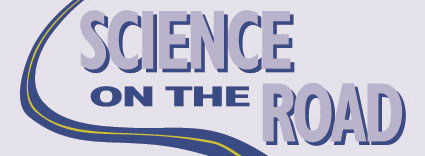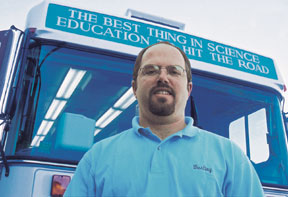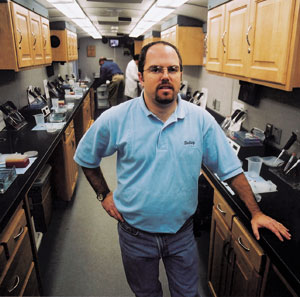

A publication of The Graduate School, University of North Carolina at Chapel Hill
Archives Fall 2002
Home | Back issues | About us | The Graduate School | UNC-Chapel Hill | Make a gift
 Leading young scientists toward new destinies |
 |
|
Photo
by Karen Tam
|
|
Jory
Weintraub and his colleagues travel the highways and local roads spanning
North Carolina to spread their enthusiasm for science and education. They
ride aboard Destiny, a 40-foot long bus refurbished as a rolling science
and computer lab. Their mission is to advance high school science education
to interest students in pursuing advanced science degrees and future science
careers.
When Destiny arrives
at a North Carolina high school, students may be charged with solving
a murder by using sophisticated DNA fingerprinting techniques to examine
evidence left by the perpetrator. At another school, students may need
to identify which of three patients is afflicted with sickle cell disease
by using gel electro-phoresis and scouring the Internet to find information
vital to their diagnosis. Equipped with IBM laptops and wireless Internet,
the students plunge into their research and investigations.
“The feedback
from students is overwhelming,” says Weintraub. “They say things
like, ‘I never thought science could be so interesting, ’ or
‘I always thought this would be so confusing. ’”
Weintraub is a
teacher first and a researcher second, an unusual circumstance for people
with a doctorate in science. “The opportunity to get advanced training
in science education is really hard to come by because there aren’t
a lot of people who choose to get a Ph.D. and then focus entirely on education,”
says Weintraub. He came to Carolina in 1993, was awarded a Royster Dissertation
Fellowship and earned his Ph.D. in immunology in 1999. During that time
Weintraub, his wife and their two children developed roots in North Carolina,
and they wanted to stay.
The challenge
for him was to find a post-doctoral opportunity that emphasized teaching
and course development, to remain in North Carolina, and to find funding
allowing him to do both.
Weintraub’s
search for the ideal post-doctoral opportunity led him to the Partnership
for Minority Advancement in the Biomolecular Sciences, or PMABS. PMABS
started 12 years ago in the biology department at Carolina. The consortium
comprises Carolina and seven historically minority universities (HMUs)
in North Carolina. The consortium’s mission is to increase the representation
and advancement of under-represented groups in science careers.
One manifestation
of the consortium’s goals is the Destiny bus. Another is the distributed
learning network, or DLN. Weintraub and his colleagues are developing
technology that will enable them to video and teleconference Weintraub’s
immunology class to each of the campuses in the PMABS consortium. The
distributed learning network classes are fully interactive, and students
on the seven campuses will take the class simultaneously with students
at Carolina. “The goal of DLN,” says Weintraub, “is to
provide students at all of the partner universities access to courses
which would not otherwise be available to them.”
Weintraub believes
that distance learning will not hinder students who are not attending
the classes where the instructor is physically present. “As someone
whose main passion is teaching, I still think that the most powerful thing
is students interacting directly with the instructor. But the alternative
in this case is students never get the class otherwise,” Weintraub
said. “So if the difference is never having immunology or having
it via distance, as long as we’re putting every effort we can into
making it an offered course, it’s still a much preferable option
than not getting it at all.” Once the technology is perfected, Weintraub
hopes to teach at Chapel Hill and at Pembroke via the distributed learning
network in the spring semester.
Weintraub’s
classes at Carolina and at the historically minority universities are
equally demanding. He has paired his students at Fayetteville State University
with his Carolina students in collaborative projects. Weintraub says the
HMUs have good quality education and educators, but many do not have the
same access to resources that Carolina does.
Weintraub’s
commitment to closing the resource gap is also evident in his work with
science and technology professionals. “We take trained research scientists
who are interested in science education and combine them with trained
information technology experts,” Weintraub said. “The goal is
to try to advance the overarching goals of PMABS through the creative
use of emerging and existing technologies. We can use IT to improve science
education and hopefully give students at HMUs a better way to have a career
in science.”
 |
| Photo by Karen Tam |
|
Inside a science laboratory on wheels. |
Weintraub said
that the partnership of the administration and faculty of the historically
minority universities is essential to the success of PMABS, the Destiny
bus, and the distributed learning network. “This is not a charity
thing,” Weintraub says. “It’s a team effort.”
Jory Weintraub’s
work is very rewarding. He is happy to be in North Carolina and working
to improve science education all over the state; as far west as Johnson
C. Smith University in Charlotte to as far east as Elizabeth City State
University in Elizabeth City.
“Now I feel like I’m in a situation that is really important,” Weintraub says. “I feel like I’m helping people directly.”
- Joy Buchanan
© 2002, The Graduate School, The University of
North Carolina at Chapel Hill
All text and images are property of The Graduate School
at the University of North Carolina-Chapel Hill. Contact Sandra Hoeflich
at shoeflic@email.unc.edu
to request permission for reproduction.